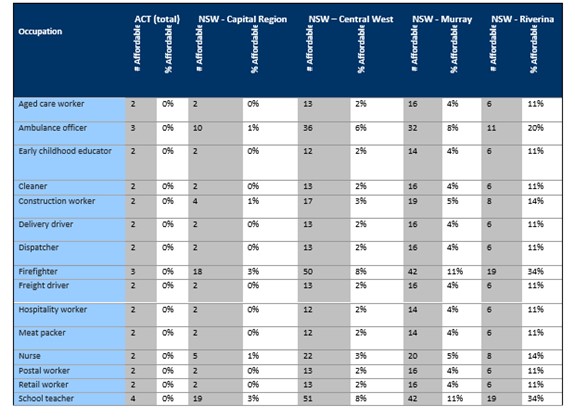Nurses, teachers, early childhood educators, and other essential workers cannot find affordable rental properties in the ACT, according to Anglicare’s Essential Workers Report released this week.
“If no action is taken, both the workforce crisis and the housing crisis will continue to grow,” Anglicare warns.
On the Snapshot weekend of 17 March, none of the properties listed as available in the ACT were affordable and appropriate for any of the 16 essential workers categories.

“These workers are absolutely vital to the daily operation, the safety and the liveability of our communities,” said Brandon Howard, Anglicare NSW South, NSW West and ACT CEO. “We rely on the important contribution of these individuals and the roles they play in our communities. We must do more to make sure they can continue to live in the places in which they serve.”
High rental rates make it difficult for essential workers to afford housing near where they work, exacerbating workforce shortages, Anglicare argues. Employers cannot fill vacant job positions, resulting in unstaffed shifts vacant and work not done; industries cannot recruit enough personnel to meet their needs; and essential workers cannot move to where their skills are needed, because they cannot afford to rent.
“So many essential industries are facing workforce shortages with workers unable to afford to stay or move to parts of the country where these shortages are at their worst,” Anglicare Australia executive director Kasy Chambers said. “These numbers help explain why.”
This week’s report follows April’s Rental Affordability Snapshot, which stated that the ACT was “the most unaffordable location [in Australia] for almost every category of people on low incomes”, and the housing crisis was getting worse. People on welfare could not afford to rent at all.
“The situation is little better for people in secure jobs, providing essential services that support the liveability and wellbeing of our communities,” according to Anglicare’s latest report. “The housing crisis is climbing the rungs of the income ladder.”
This rise of the working poor concerns many, from politicians like Senator David Pocock and Greens MLA Johnathan Davis to community sector peak bodies like ACTCOSS to charities like Mohammed Ali’s HelpingACT.
At the moment, not-for-profits like Anglicare provide support for those in need – including emergency food relief to an increasing number of full-time workers who cannot afford to pay rent and eat.
But, Anglicare insists: “The severity of the current housing crisis will require meaningful solutions from local and federal governments.”
Chief Minister Andrew Barr, state premiers, and housing ministers are attending a Cabinet meeting today to discuss the housing crisis.
“We ask that they consider all the options available to them to address the current housing crisis,” Mr Howard said. “Anglicare stands ready to partner with Government to ensure everyone has access to safe and affordable housing.”
Anglicare believes the solution is to construct new social and affordable homes. Over the past four decades, it states, housing has been privatised and social housing stocks have dwindled, as the federal government has spent more on schemes that incentivise the private market (negative gearing tax breaks and rent assistance payments) and less on social housing. The result is that there is an oversupply of dwellings, compared to needs and demographics, but a shortage of social and affordable homes. Between 165,000 and 240,000 new dwellings are built across Australia each year, Anglicare states, but only 3,000 social homes; Anglicare believes that 15,000 new social homes must be built every year across the country.
“The trickle-down housing approach is failing to supply affordable housing,” Anglicare states. “It is untenable for governments to simply ignore the reality facing everyday Australians.”
Housing costs grow faster than incomes or wages, Anglicare argues, because taxation and concessions encourage housing as a method of speculative investment, driving up house prices for first home buyers, pushing up rental prices, and costing the government $130 billion each year in revenue. These concessions should be undone, and the money invested in affordable housing, Anglicare states.
Likewise, Anglicare argues, the government should guarantee a living wage “that would keep people out of poverty and provide an acceptable standard of living, including being able to afford a secure home, food on the table, pay the bills, and afford healthcare”. Currently, the average rent cost is just under 60 per cent of the average full-time weekly minimum wage. Wages in the “historically … undervalued” community services industry should be increased; wages for care workers have not kept up with living costs, Anglicare states.
Anglicare also called for better protection for renters, now that renting is a long-term housing option. While the ACT Government has introduced rental reforms to protect tenants, Anglicare is concerned these rely upon the tenant to take action against their landlord for breaching the regulations; “tenants may be less likely to protest as the landlord still holds all the power”. Anglicare called for nationally consistent protections and uniform tenancy safeguards to protect renters’ rights. Secure, long-term leases and head leasing programs should also be a mainstream option, “to ensure that people who are disadvantaged in the rental market get a fair go”.
“If governments do not act now, then they will be accepting uncertainty and crippling costs as a feature of our rental market for the long term,” Anglicare warned. “We cannot allow this crisis to become a permanent reality. Now is the time for governments to step up and ensure Australians can find a place to call home.”



